- info@firealarmfromspace.com
- +1 (202) 256-3190
The Facts
The Environmental Equity Impact of Wildfires
- The true impacts of wildfires on personal and emotional levels cannot be measured.
- The impact on children's and individual lives' lasts a lifetime.
- Wildfires deplete our planet's environmental savings account.
- Recent California wildfires demonstrate the urgency of sending small fire locations soonest directly to the closest individuals and first responders.
- Zybach's hypothesis is that the economic impact of wildfires has been greatly underestimated.
- Zybach believes the true post-effect of wildfire economic impact to be 10x to 50x the costs of wildfire fire suppression costs.
- Sen Heinrich's independent report displays wildfire devastation and wildfire economic impacts.
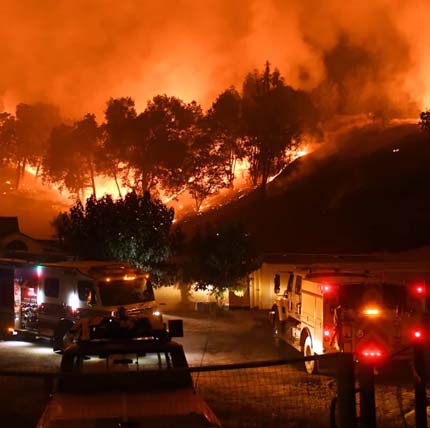
Wildfires Deplete Our Planet's Environmental Savings Account
Environmental Equity Impact of Wildfires
We deem all our planet's natural resources as the planet's environmental savings account. By depleting this environmental savings account, we conclude that wildfires cause a loss of the planet's environmental equity. The loss of this environmental equity due to wildfires will last a generation, if not longer!
Our goal is to convince you that our dream of using PROJECT HALO to retain the planet's environmental equity is not just the right thing to do for the planet, but also cost-effective versus trying to recover from wildfire devastation.
PROJECT HALO Environmental Equity Analysis
As an example, yearly wildfire suppression costs ranges between $2-$4 Billion per year in the United States.
There are multiple fire suppression costs discussed across the internet, all with their own assumptions.
Zybach's "Cost-Plus-Loss" approach quantifies post wildfire economic impacts from 10x to 50x fire suppression costs. (See chart)
We will assume the loss of environmental equity by wildfires will be 10x to 50x wildfire suppression costs per year.
We will apply the 10x and 50x to the estimated $2B and $4B estimated wildfire suppression costs per year.
A recent report from Sen Heinrich of New Mexico estimates that the economic impact (we assume most of these costs are environmental costs) is between $393 to $893 Billion annually. We consider these economic impacts in our vernacular to be a loss of environmental equity.
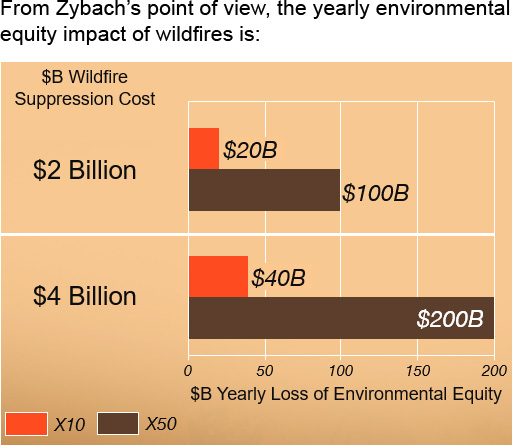
Environmental Equity Findings
We will assume PROJECT HALO prevents as little as 5% of wildfires, and local first responders put fires out while they are small and do not grow into wildfires (we feel more than confident that we will identify .greater than 5% of the wildfires but are using this number is for illustration purposes).
PROJECT HALO's impact on retaining our planet's environmental equity will be:
Thus, using Zybach's hypothesis, the retained environmental equity results of seeing fires early and having local first responders put them out while they are small is from $1B to $10B per year. PROJECT HALO will be in operation for many years!
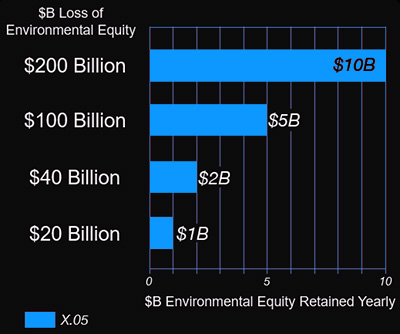
PROJECT HALO Environmental Equity Savings
Return on Investment (ROI) Using Zybach Hypothesis
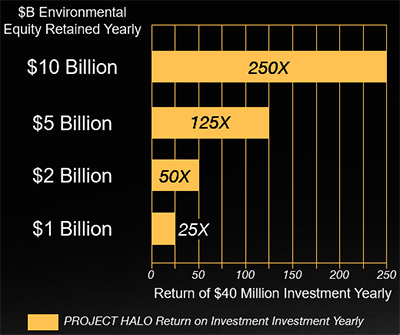
Thus, using Zybach's hypothesis, the retained environmental equity results of seeing fires early and having local first responders put them out while they are small is from $1B to $10B per year. PROJECT HALO will be in operation for many years!
We assume that PROJECT HALO will not exceed $40M*
PROJECT HALO will be in operation for many years.
*Cost range $25-40M. $4.9M 12-18-month study will provide detailed design, cost, and schedule. Goal: The study starts on-orbit operation in 28 months. PROJECT HALO will be in operation for many years.
We see PROJECT HALO as a philanthropic effort to save our environmental equity soonest.
PROJECT HALO Environmental Equity
Return on Investment (ROI) - Heinrich Assumptions
If we use Sen Heinrich's report analysis and estimate, we will see a 5% reduction in potential wildfires, which happens because local first responders put fires out while they are small, we broadly retain the following environmental equity.
Thus, using Heinrich's report's data, the retained environmental equity results from seeing fires early and having local first responders put them out while they are small is from $19.65B to $44.65B per year.
PROJECT HALO will be in operation for many years.
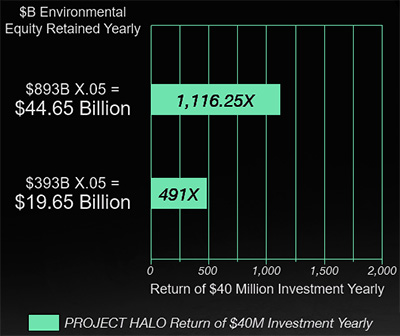
Environmental Summary
- We believe the effects of wildfires are more far-reaching than economic impacts.
- We believe wildfires deplete the planet's environmental equity. The loss of this priceless environmental equity lasts at least a generation, if not beyond..
- We have used the Zybach, et al, report 2009, "Costs-Plus-Loss" hypothesis as a point of departure to define wildfire's impacts.
- We also used information from Heinrich's "Economic Impact of Wildfires" Report.
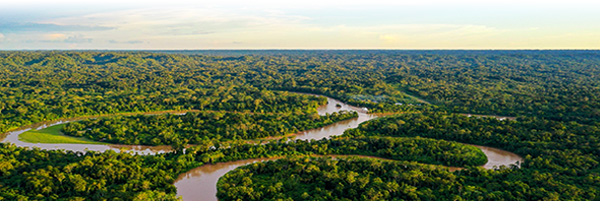
- By using PROJECT HALO, we are providing a new, additional tool that will retain invaluable environmental equity of the planet.
We have illustrated that PROJECT HALO can retain $1B to $10B of the planet's environmental equity each year by identifying and putting 5% of the fires out while they are small using Zybach's hypothesis - $19B to $45B planet's environmental equity each year using Heinrich's estimates. - We have also illustrated the return on investment (ROI) for PROJECT HALO deployment, and resultant environmental equity is 25x to 250x per year Zybach; 491x to 1,117x per year Heinrich.
- PROJECT HALO's retention of the planet's environmental equity is not just the right thing to do for the planet but also incredibly cost-effective versus trying to recover from wildfire devastation.
- PROJECT HALO will be in operation for many years.
- Note: With our expertise and experience, we consider building and deploying the PROJECT HALO satellite a "sophomore" project.
Wide Area Coverage Ensures
Continuous 24/7/365 Tracking of Critical Risk Areas




Amazon Environmental Defense Coverage Area


Project Halo Foundation is a registered 501(c)(3) organization.
Copyright ©2024-2026 Project Halo Foundation. All rights reserved.
Home | About Us | The Method | Our Mission | The Facts | Contact
